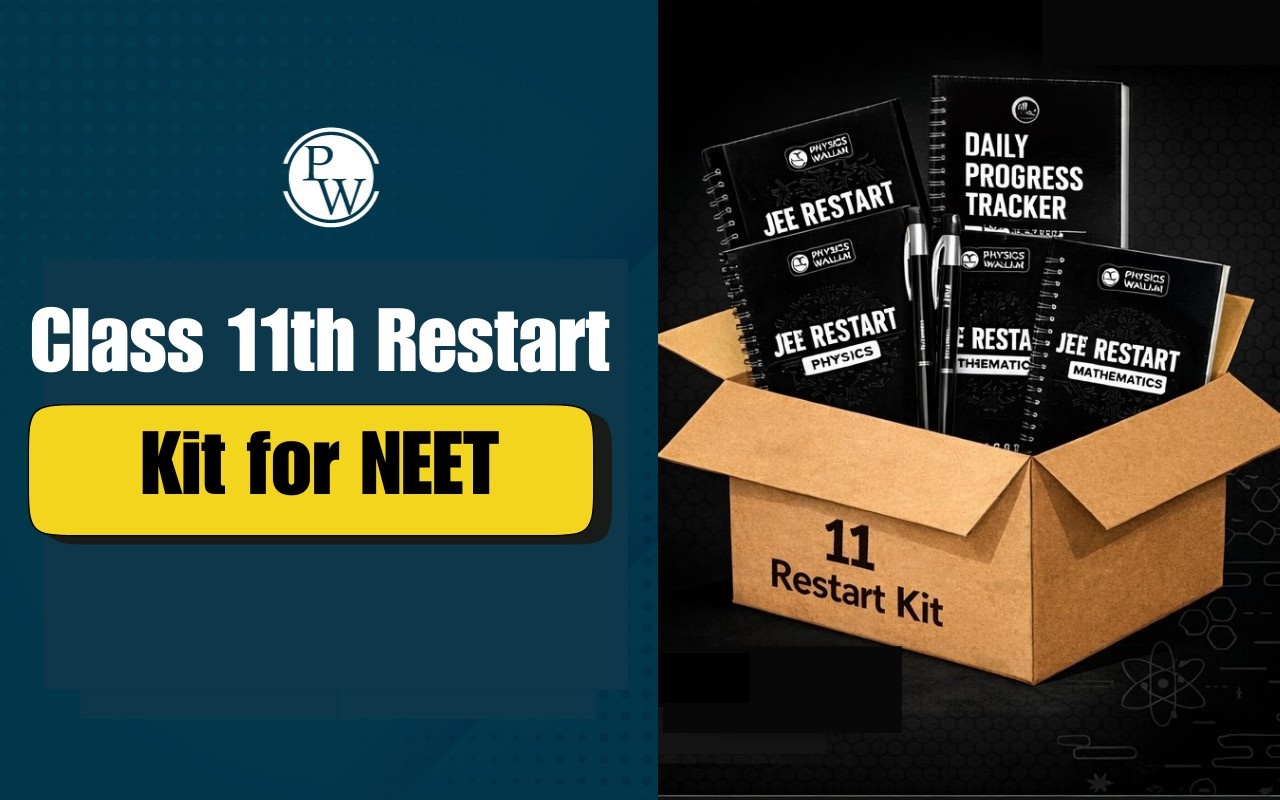
Difference Between MCB and MCCB: Understanding the distinctions between MCBs (Miniature Circuit Breakers) and MCCBs (Molded Case Circuit Breakers) is essential for efficient electrical circuit protection. While both are critical in preventing electrical overloads and short circuits, they exhibit differences in design, functionality, and applications.
This comparison will delve into the key factors that set MCBs and MCCBs apart, shedding light on their characteristics and best-suited scenarios. Whether you're an electrical professional or a curious learner, this exploration aims to enhance your understanding of the difference between MCB and MCCB, fundamental circuit protection devices. Embarking on the journey to NEET success requires a comprehensive and well-structured study plan, and the " Lakshya for NEET " study material by Physics Wallah is designed precisely for this purpose. Tailored for Class 12 students preparing for the NEET exam, this program caters to the needs of medical aspirants, providing them with a reliable guide to navigate through the intricacies of the examination.| NEET Biology Syllabus | NEET Biology Diagrams |
| NEET Biology MCQ | NEET Biology Chapter wise Weightage |
| NEET Biology Notes | NEET Previous Year Question papers |
Difference Between MCB and MCCB Overview
MCBs (Miniature Circuit Breakers) are devices designed with a thermal or thermo-magnetic base. They offer protection against both overcurrent and short circuits. Typically available with a maximum current rating of 100A and a maximum short circuit capacity of 25kA, MCBs find common use in lighting circuits. It's important to note that the trip level of MCBs cannot be varied. They come in various configurations, including single, two, three, and four-pole versions, catering to different circuit requirements. MCCBs (Molded Case Circuit Breakers) are versatile devices in thermal, thermo-magnetic, or electronic trip types. In addition to offering protection against overcurrent and short circuits, MCCBs can protect against earth faults, residual currents, voltage, and more. With a broader range, MCCBs are available with ratings up to 2500A. Unlike MCBs, the trip level of adjustable trip type MCCBs can be varied. They are commonly employed for loads exceeding 100A and in motor protection circuits. Some MCCBs even feature a microcontroller base. Like MCBs, MCCBs are available in single, two, three, and four-pole versions, offering flexibility for different applications. While MCBs are favored for their compact design and suitability for smaller installations, MCCBs provide a more robust and adjustable solution for medium-voltage applications, offering enhanced protection and flexibility. The choice between MCB and MCCB depends on the scale and requirements of the electrical system.
What is MCB?
A Miniature Circuit Breaker, or MCB, is a compact circuit protection device for low-voltage electrical systems. It is essential to safeguard electrical circuits from overcurrent and short circuits. MCBs are widely used in residential and small commercial installations due to their compact size and fixed-tripping characteristics. They are available in various current ratings, allowing users to choose the appropriate MCB based on the specific requirements of the electrical circuit. MCBs offer a convenient solution for individual circuit protection, isolating faulty circuits without affecting the entire electrical system. These breakers typically have quick response times, swiftly interrupting the circuit in the event of an overcurrent or short circuit. While MCBs are effective in smaller-scale applications, they may need more flexibility and adjustability for more extensive electrical systems.
MCB Examples
Here are examples of MCB:
Residential Electrical Panel
In a typical residential electrical panel, several MCBs serve as individual circuit breakers for different circuits. Each MCB is responsible for protecting a specific branch of the electrical system. For instance, there might be separate MCBs for lighting circuits, kitchen appliances, or bedroom outlets. In case of a fault or overcurrent in one of these circuits, the corresponding MCB will trip, isolating the faulty circuit while allowing the rest of the electrical system to remain operational.
Office Building Distribution Board
In an office building's distribution board or panel, MCBs are commonly used to protect various circuits. Different MCBs may be assigned to different building sections, such as lighting circuits, air conditioning systems, or power outlets in workspaces. This modular and compartmentalized approach allows for efficient maintenance and troubleshooting. If there's an issue in a specific area, the corresponding MCB can be easily identified and reset without affecting the entire building.
Retail Store Electrical Distribution
Retail establishments often utilize MCBs in their electrical distribution systems. Like residential and office setups, MCBs can be employed to protect different store areas. Refrigeration units, lighting displays, and point-of-sale systems may each have dedicated MCBs. This ensures that electrical issues in one part of the store do not disrupt the functioning of other areas, contributing to both safety and operational efficiency.
Educational Institution Electrical Infrastructure
In schools or colleges, MCBs play a crucial role in ensuring the safety of students, staff, and the electrical infrastructure itself. Various MCBs may protect classrooms, laboratories, administrative offices, and other facilities. This segmentation helps manage electrical loads effectively and ensures that a fault in one area doesn't affect the entire educational institution.
What is MCCB?
On the other hand, a Molded Case Circuit Breaker, or MCCB, is a more robust circuit protection device suitable for medium-voltage electrical systems. Enclosed in a molded case, these breakers provide overcurrent and short-circuit protection with the added advantage of adjustable tripping settings. This adjustability makes MCCBs versatile and applicable to various installations, including industrial and larger commercial settings. MCCBs are known for their higher breaking capacities than MCBs, making them capable of handling larger fault currents. The molded case housing enhances the durability and protection of the internal components, ensuring reliable performance in demanding environments. With features such as adjustable trip settings, MCCBs offer greater customization, allowing users to set precise current thresholds for tripping based on the specific needs of the electrical system.
MCCB Examples
Here are examples of MCCB:
Industrial Motor Control Panel
MCCBs are commonly used to protect motors and other heavy machinery in an industrial setting. For instance, in a motor control panel responsible for operating conveyor belts, MCCBs can be installed to safeguard the motor circuits. If there is a sudden surge or overload, the MCCB will trip, preventing motor damage and ensuring the equipment's safety.
Manufacturing Equipment Power Supply
Manufacturing facilities often rely on MCCBs to protect the power supply of critical machinery. Large production machines, such as stamping presses or CNC machines, may have dedicated MCCBs to guard against overcurrents or short circuits. The ability of MCCBs to handle higher current ratings makes them suitable for the robust power requirements of industrial equipment.
Commercial Building Main Distribution Panel
MCCBs are frequently employed in the main distribution panel that receives power from the electrical grid in commercial buildings. The MCCBs at this level provide overcurrent protection for the entire building. They can be set to trip in case of a fault, preventing excessive current from reaching the internal circuits and avoiding potential fire hazards or equipment damage.
Data Center Electrical Distribution
With their complex electrical infrastructure and high-power demands, data centers utilize MCCBs for effective circuit protection. MCCBs are strategically placed in the electrical distribution system of a data center to ensure the continuous and secure operation of servers, cooling systems, and other critical equipment. This level of protection is crucial to prevent disruptions in data processing and storage operations.
MCB vs MCCB - Difference Between MCB and MCCB
The below table shows the critical difference between MCB and MCCB :
|
MCB vs MCCB - Difference Between MCB and MCCB |
|||
|---|---|---|---|
| Sr. No. | Feature | MCB (Miniature Circuit Breaker) | MCCB (Molded Case Circuit Breaker) |
| 1 | Full Form | Miniature Circuit Breaker | Molded Case Circuit Breaker |
| 2 | Definition | MCB is a type of circuit breaker with a compact design, typically used in low-voltage electrical systems. It provides overcurrent and short circuit protection for residential and small commercial installations. MCBs have fixed tripping characteristics and are available in various current ratings. | MCCB is a type of circuit breaker enclosed in a molded case, designed for medium-voltage electrical systems. It offers overcurrent and short circuit protection with adjustable tripping settings, making it suitable for a wider range of applications, including industrial and larger commercial installations. MCCBs have higher breaking capacities compared to MCBs. |
| 3 | Size and Rating | Smaller in size and lower current ratings. | Larger in size and suitable for higher currents. |
| 4 | Application | Mainly used for low-power distribution. | Suitable for both low and medium power systems. |
| 5 | Tripping Characteristics | Typically has fixed tripping characteristics. | Offers adjustable tripping settings for flexibility. |
| 6 | Thermal and Magnetic Protection | Usually provides fixed thermal and magnetic protection. | Offers adjustable thermal and magnetic protection. |
| 7 | Breaking Capacity | Lower breaking capacity, suitable for low-power systems. | Higher breaking capacity, suitable for medium-power systems. |
| 8 | Adjustability | Generally not adjustable. | Often comes with adjustable settings for customization. |
| 9 | Typical Applications | Residential and small commercial installations. | Industrial and larger commercial installations. |
| 10 | Cost | Generally more affordable. | Often more expensive due to higher capacity and features. |
| 11 | Typical Voltage Ratings | Commonly used in low-voltage systems. | Suitable for both low and medium-voltage systems. |
| 12 | Installation Location | Typically installed closer to loads. | Installed closer to the main power source. |
For those focusing on the Physics section of the NEET exam by Physics Wallah is a goldmine of resources. this material presents solved papers in a chapter and topic-wise format, offering a systematic approach to understanding and mastering the physics concepts tested in NEET.
Difference Between MCB and MCCB FAQs
Can I use an MCB instead of an MCCB in an industrial setting?
Are there any differences in tripping characteristics between MCBs and MCCBs?
Can MCBs be used for residential power distribution?
Do MCBs and MCCBs provide short-circuit protection?
Are there cost differences between MCBs and MCCBs?










